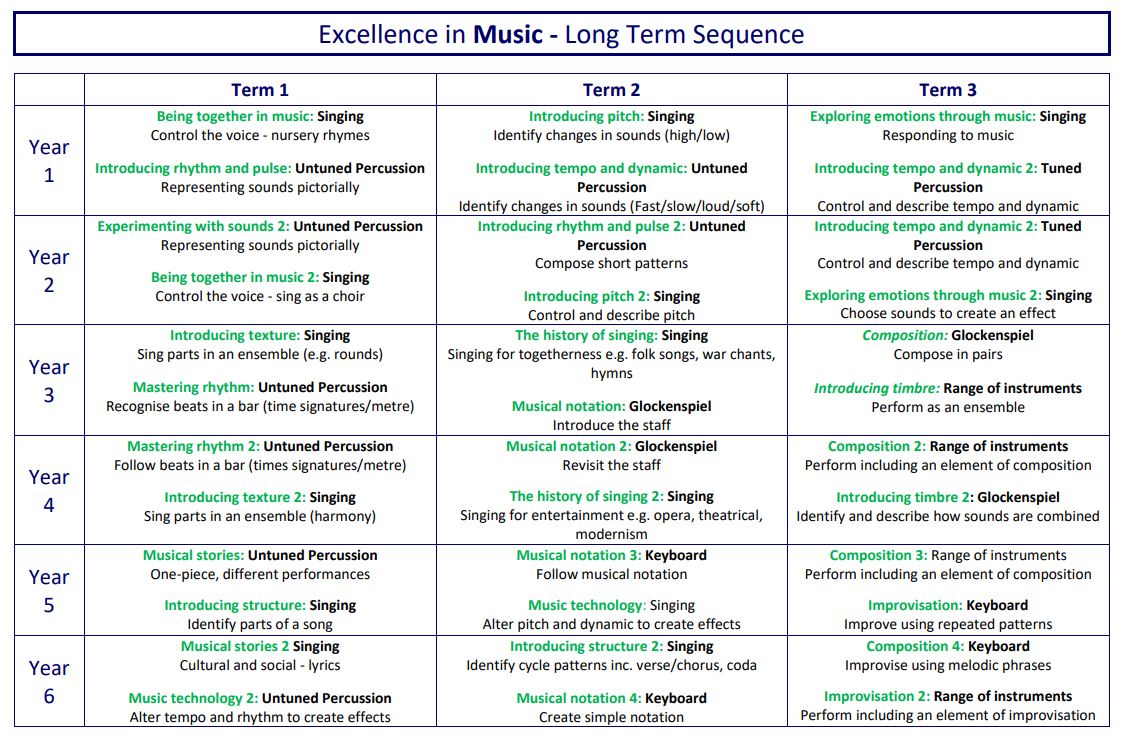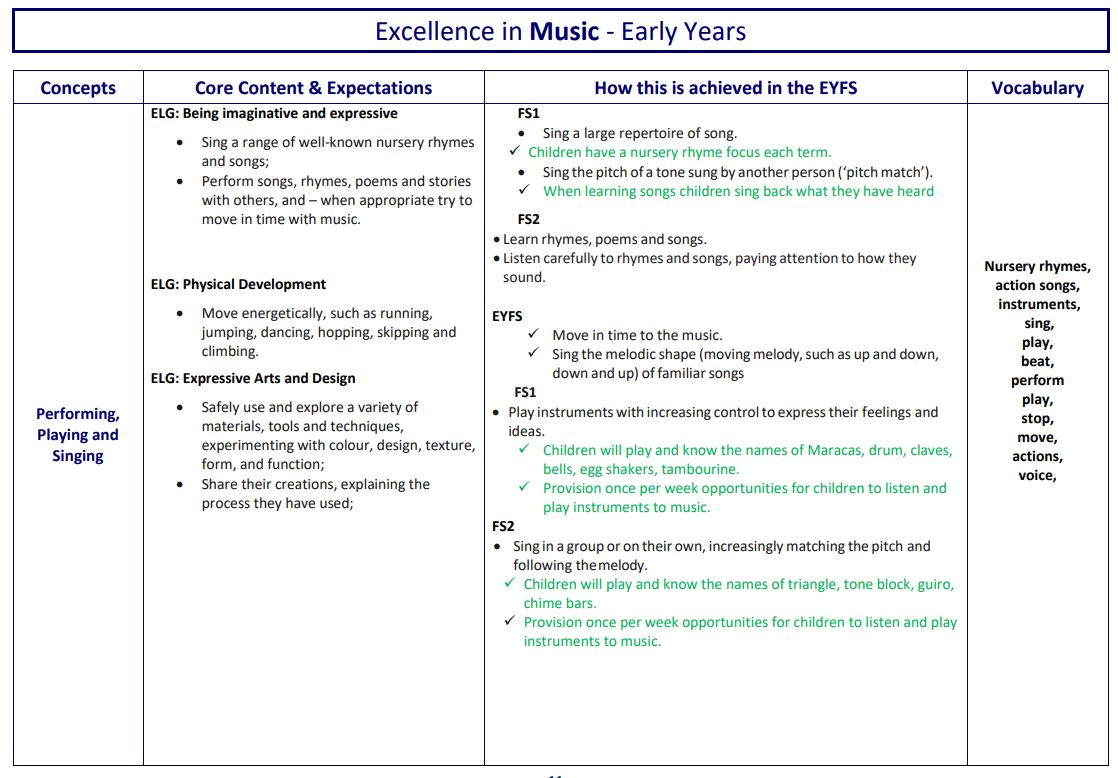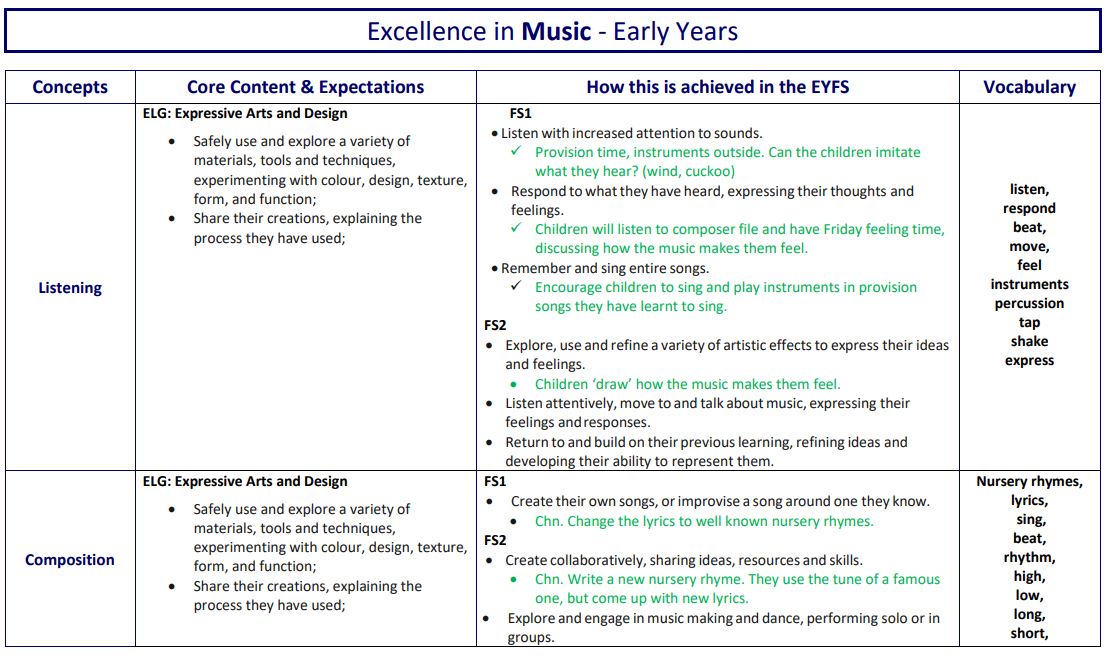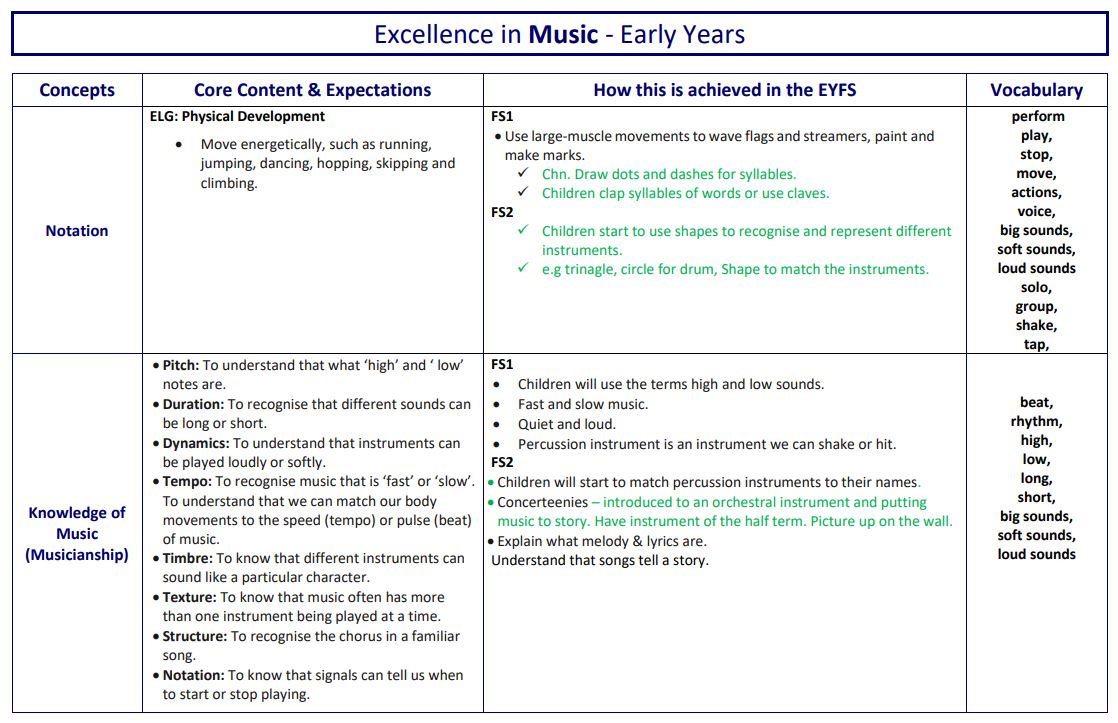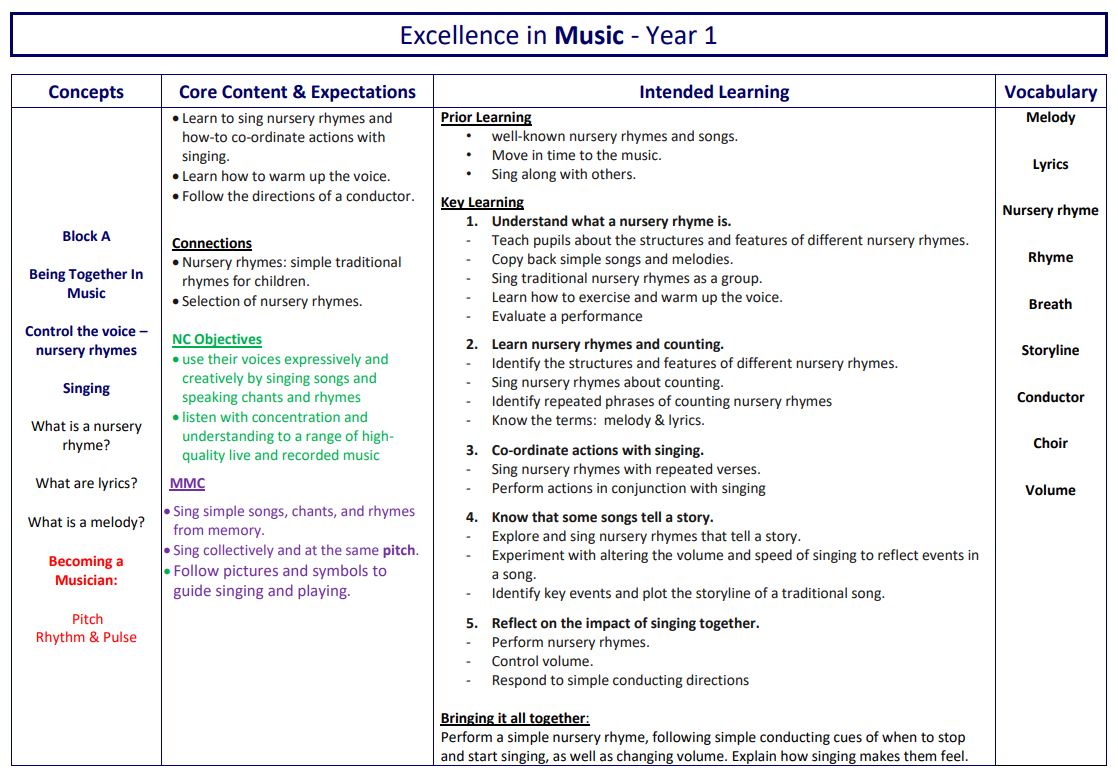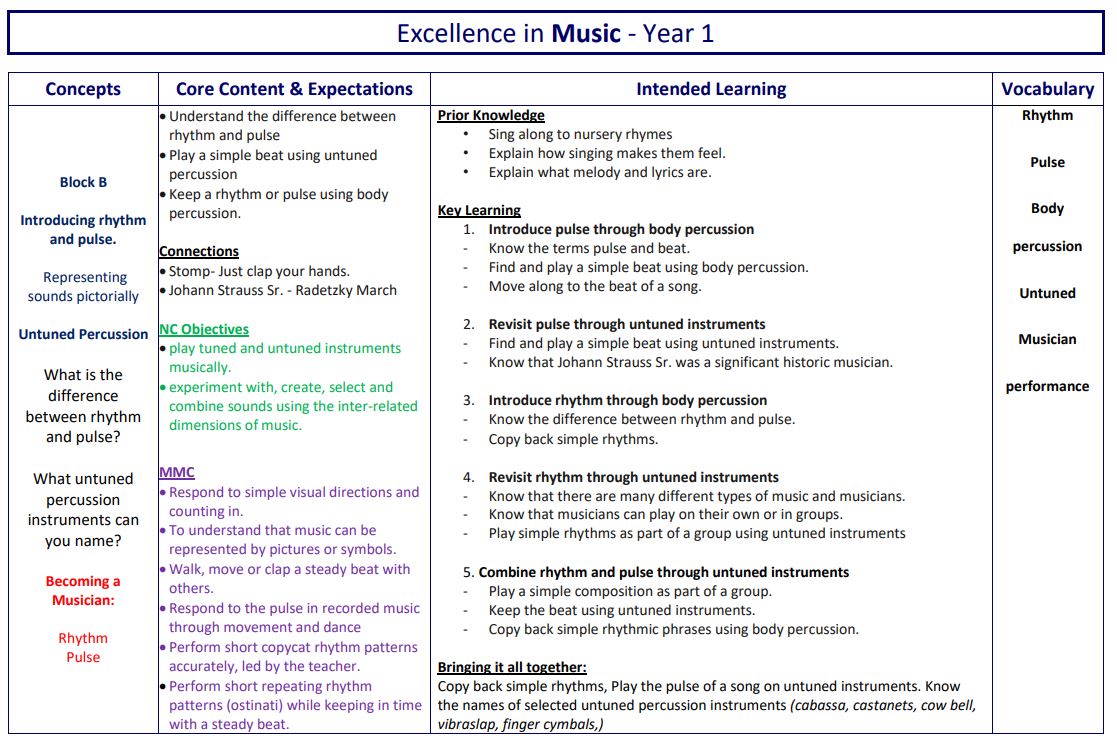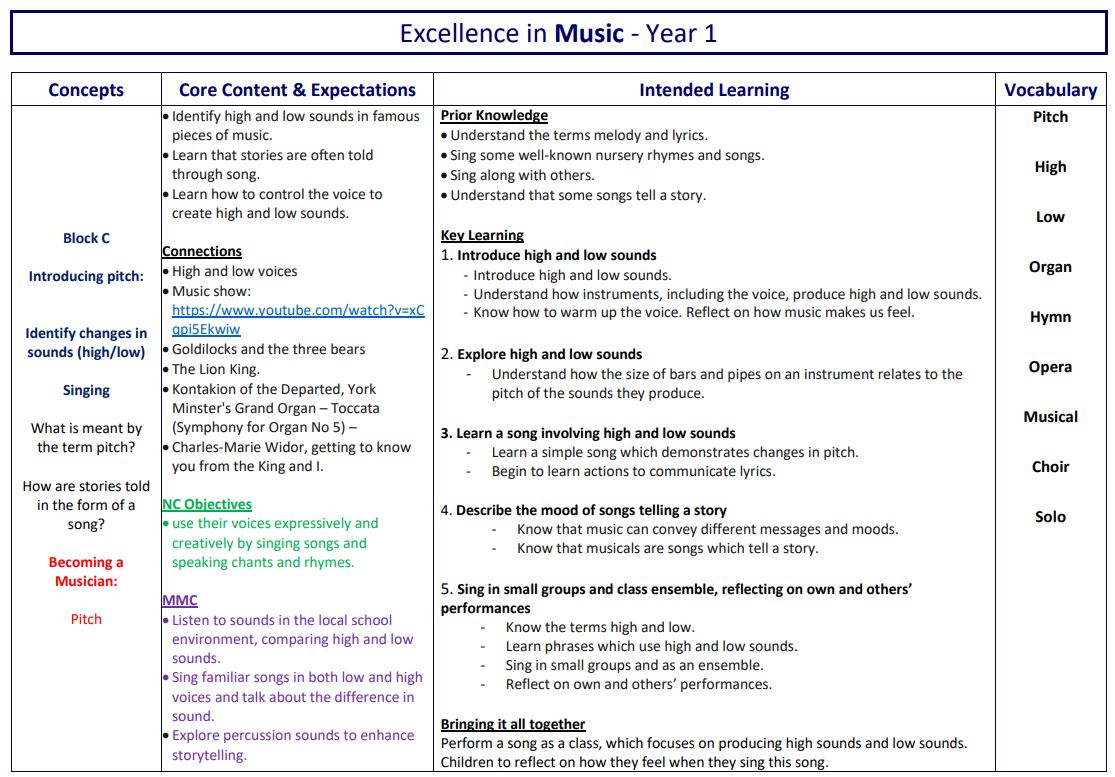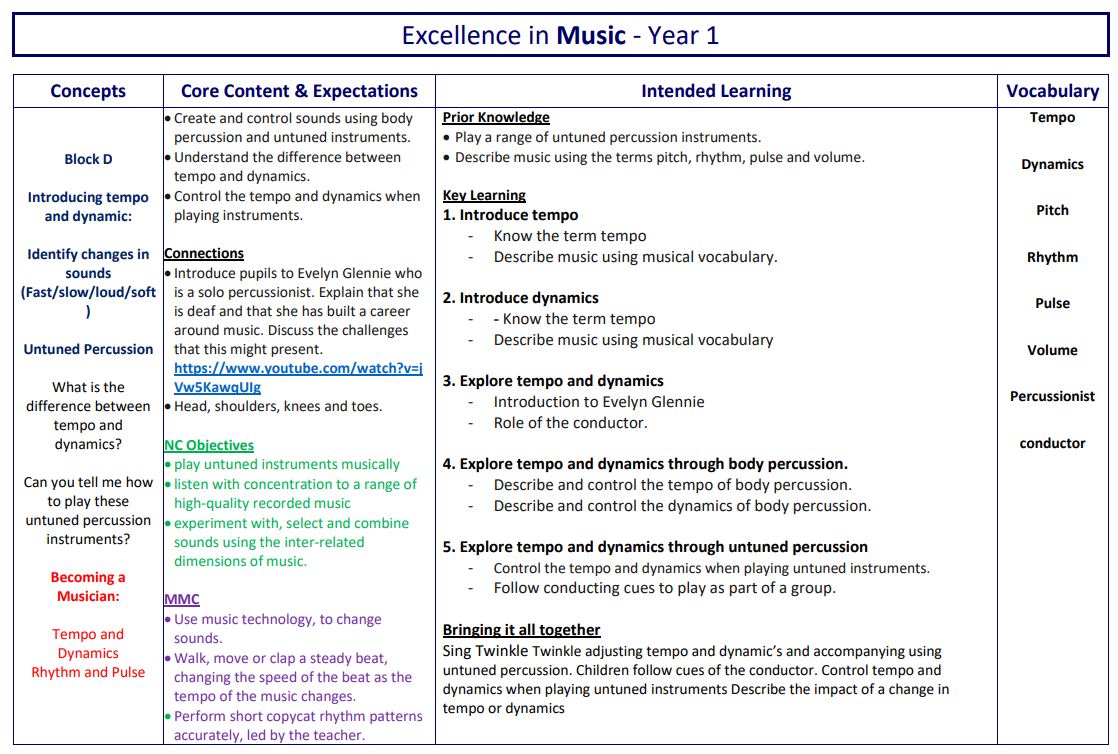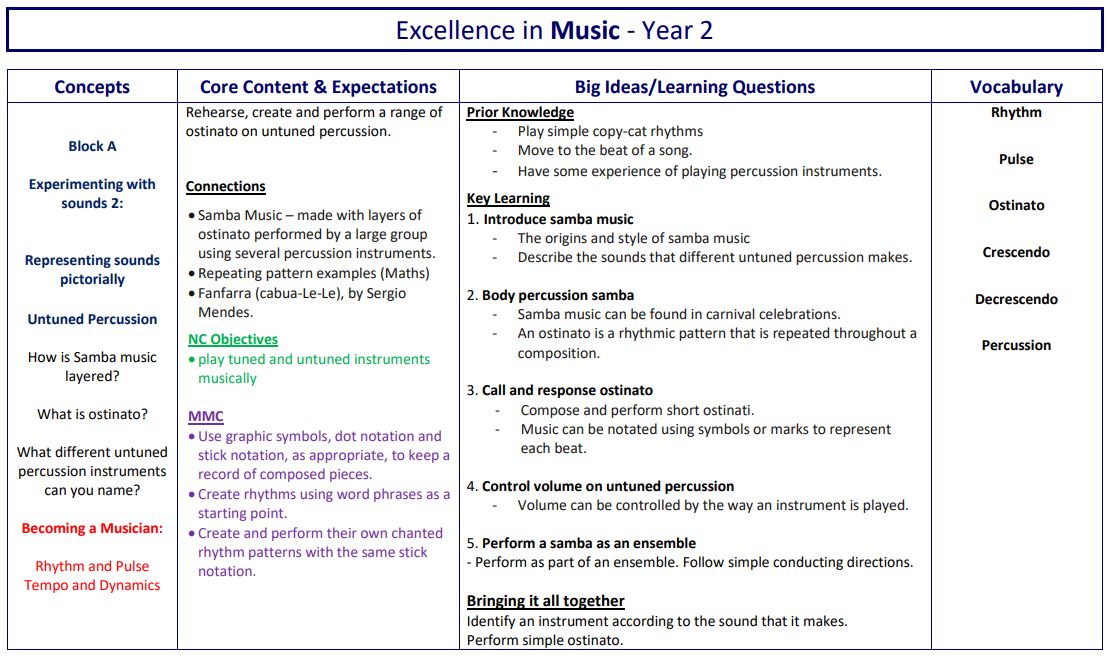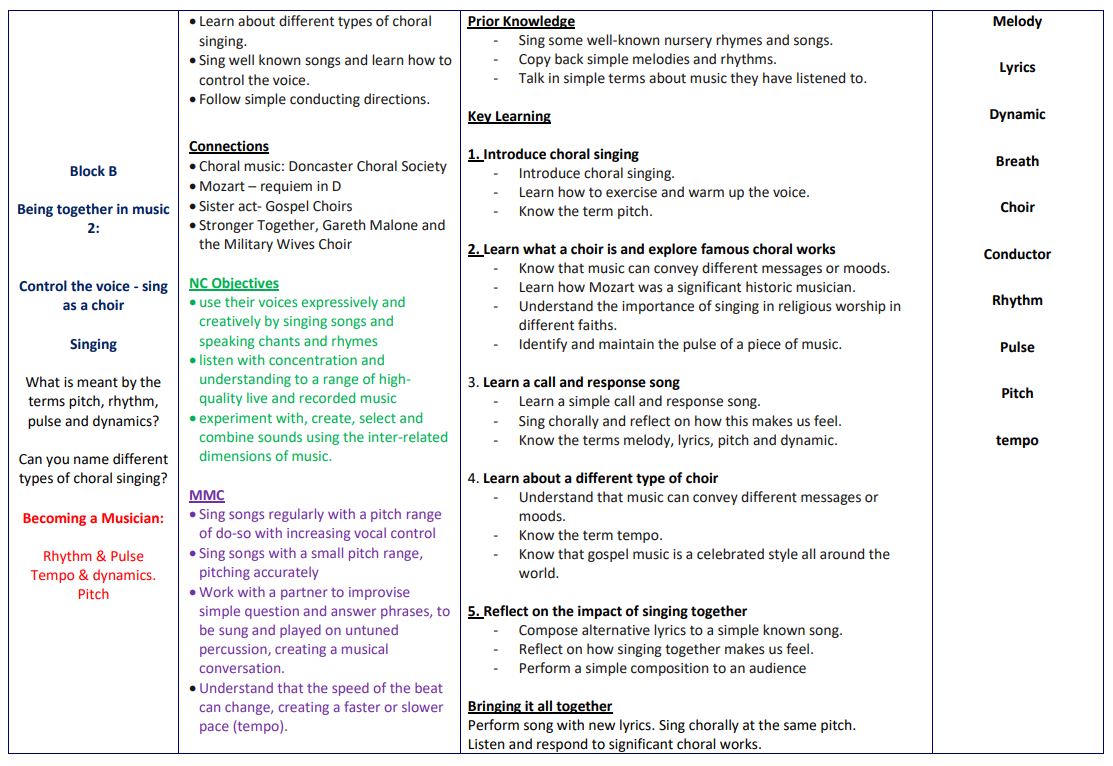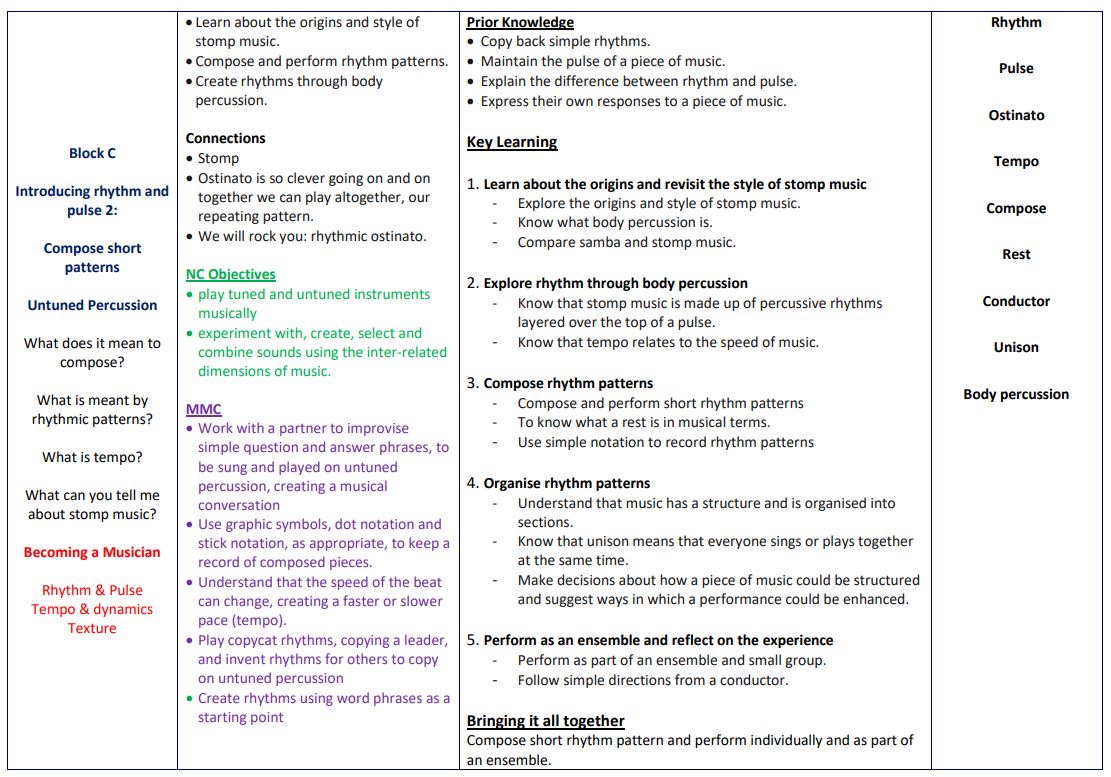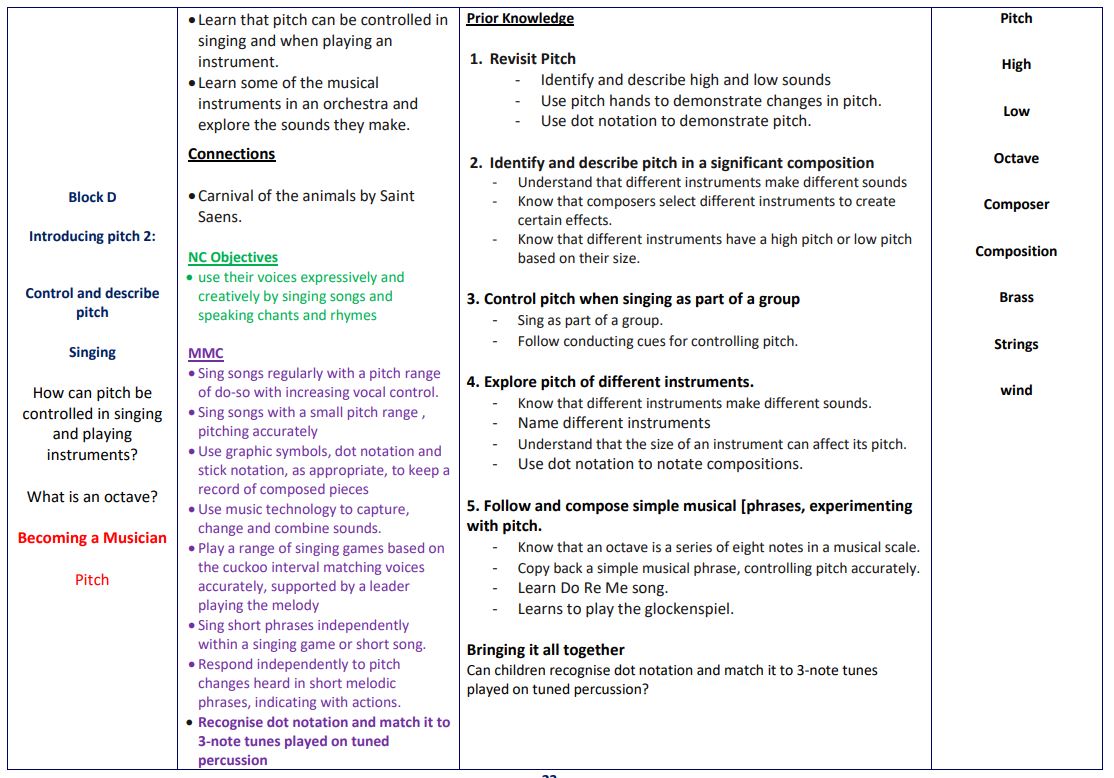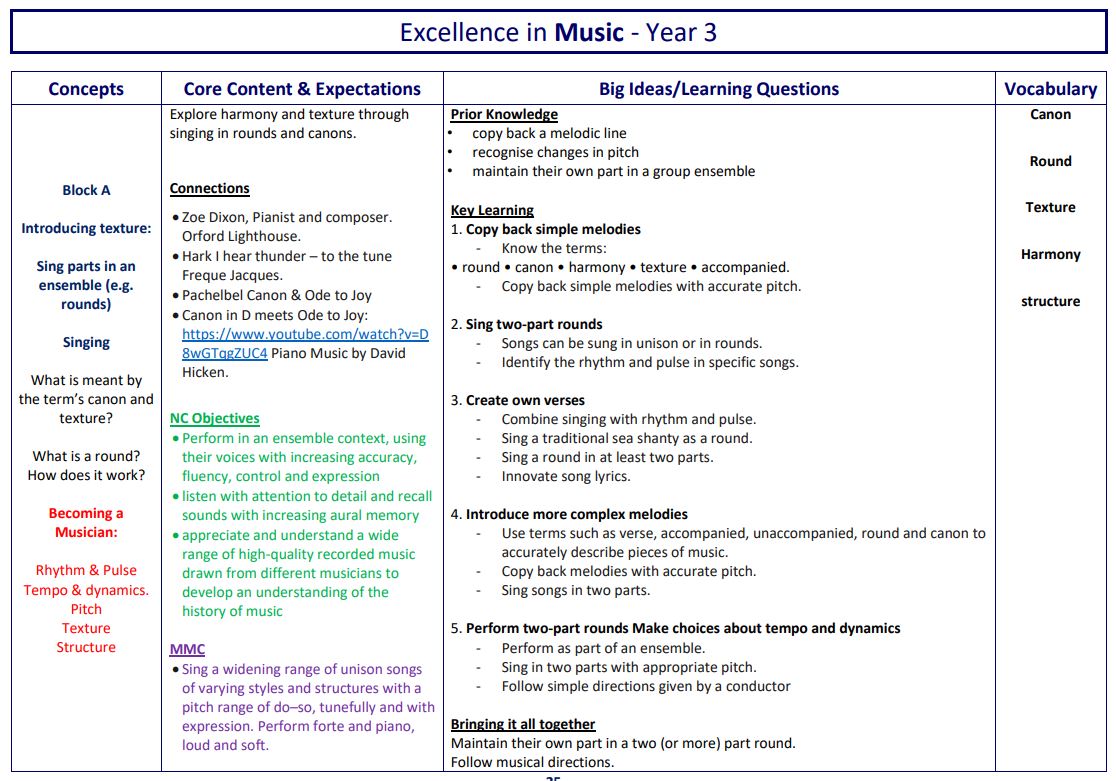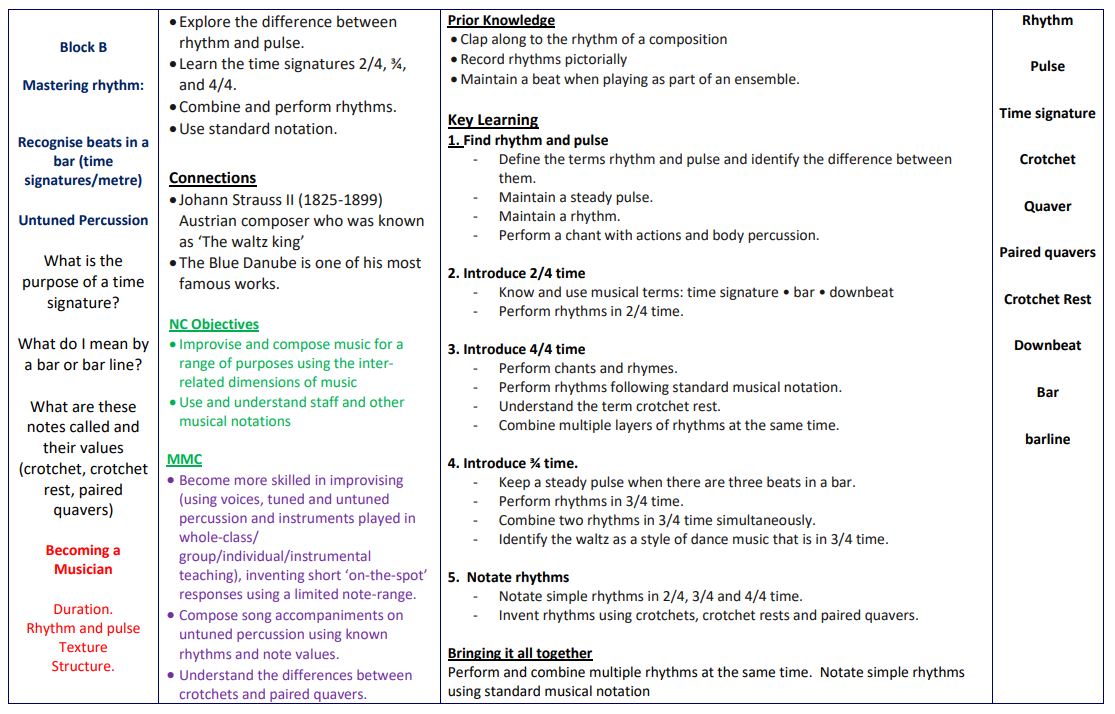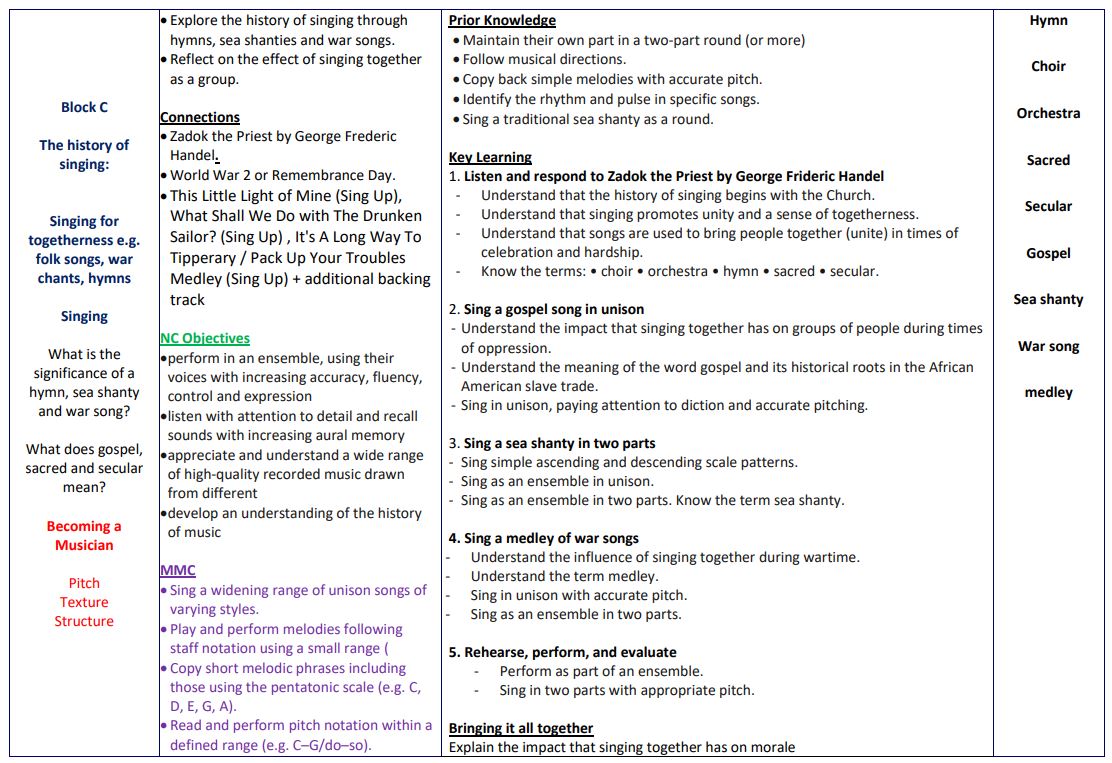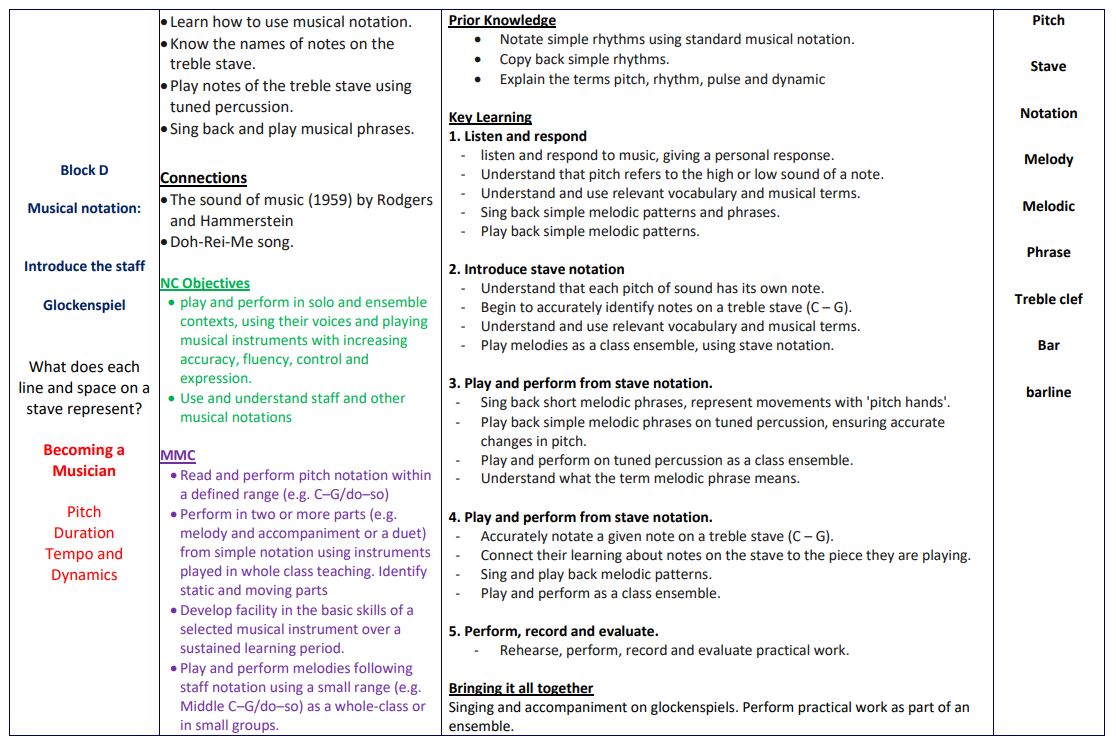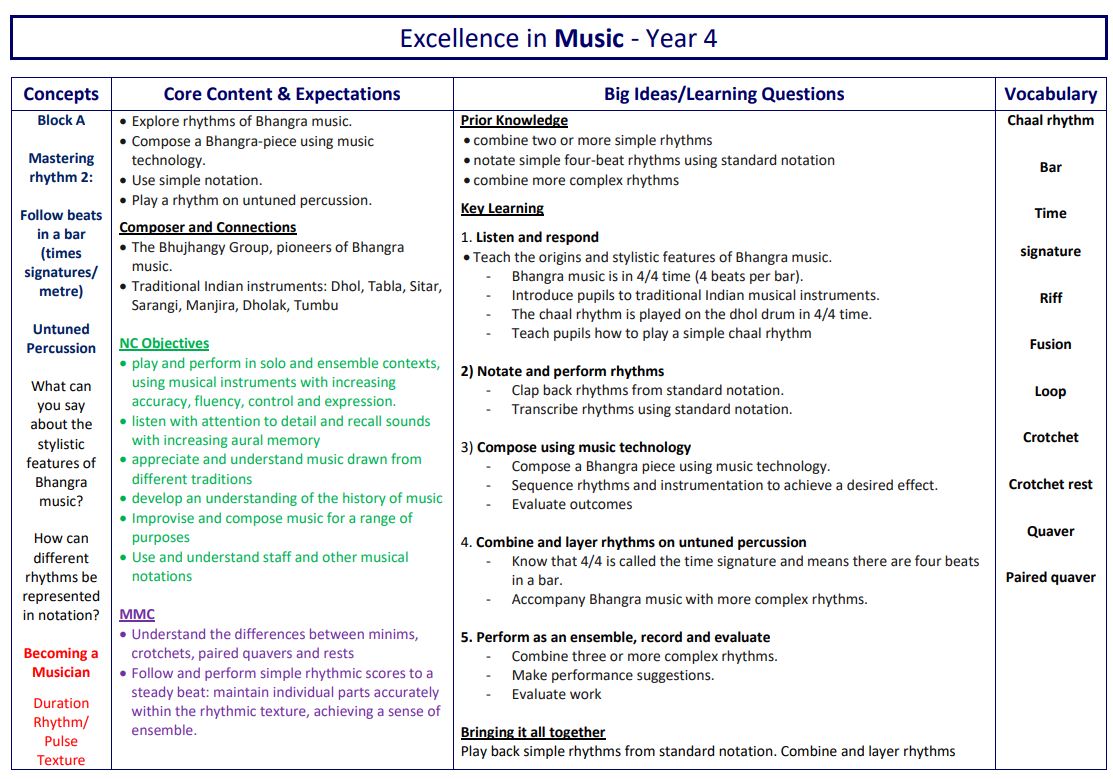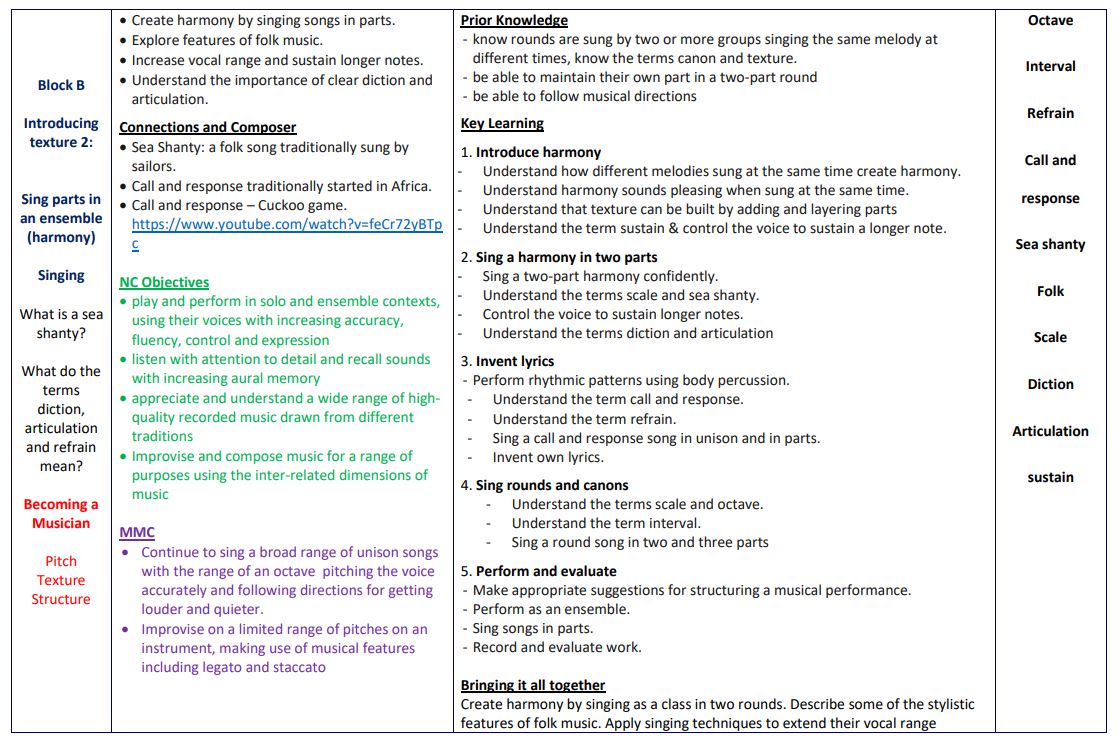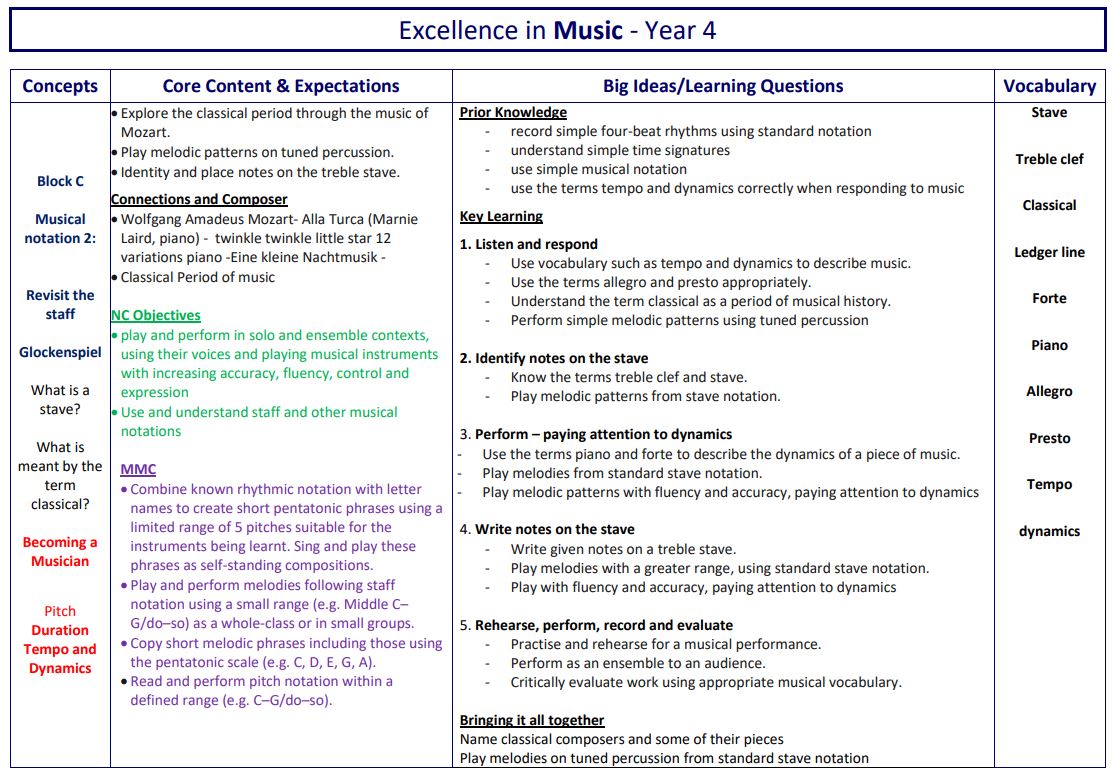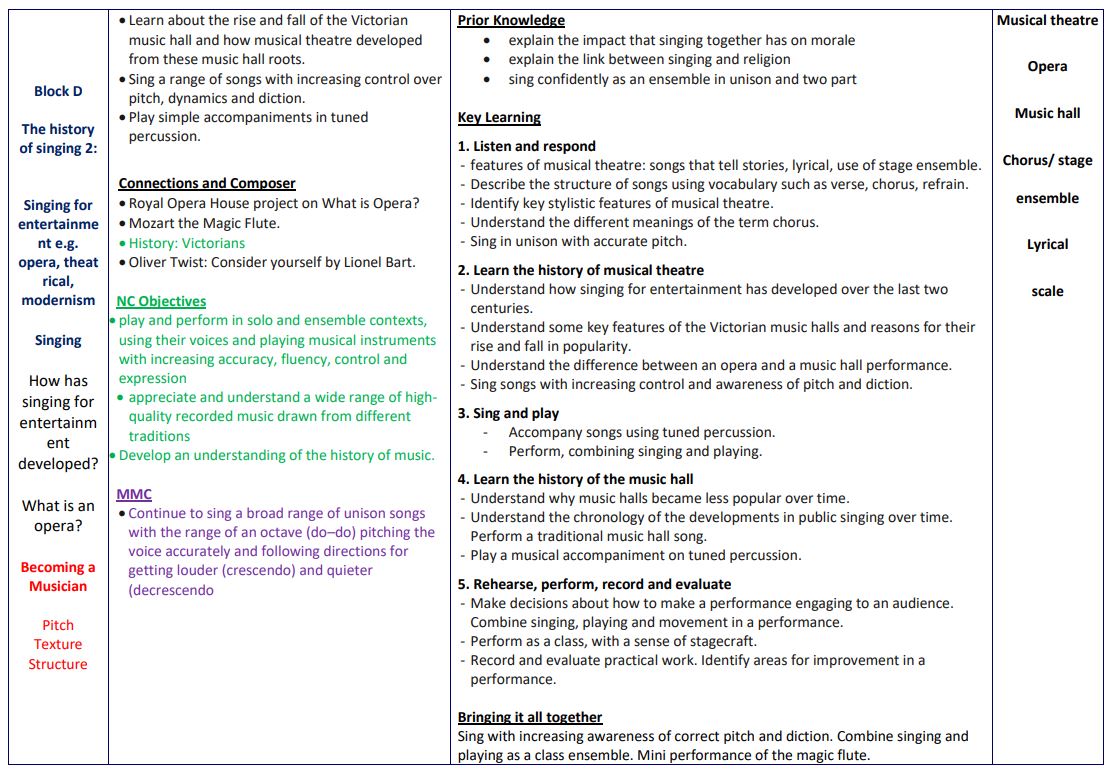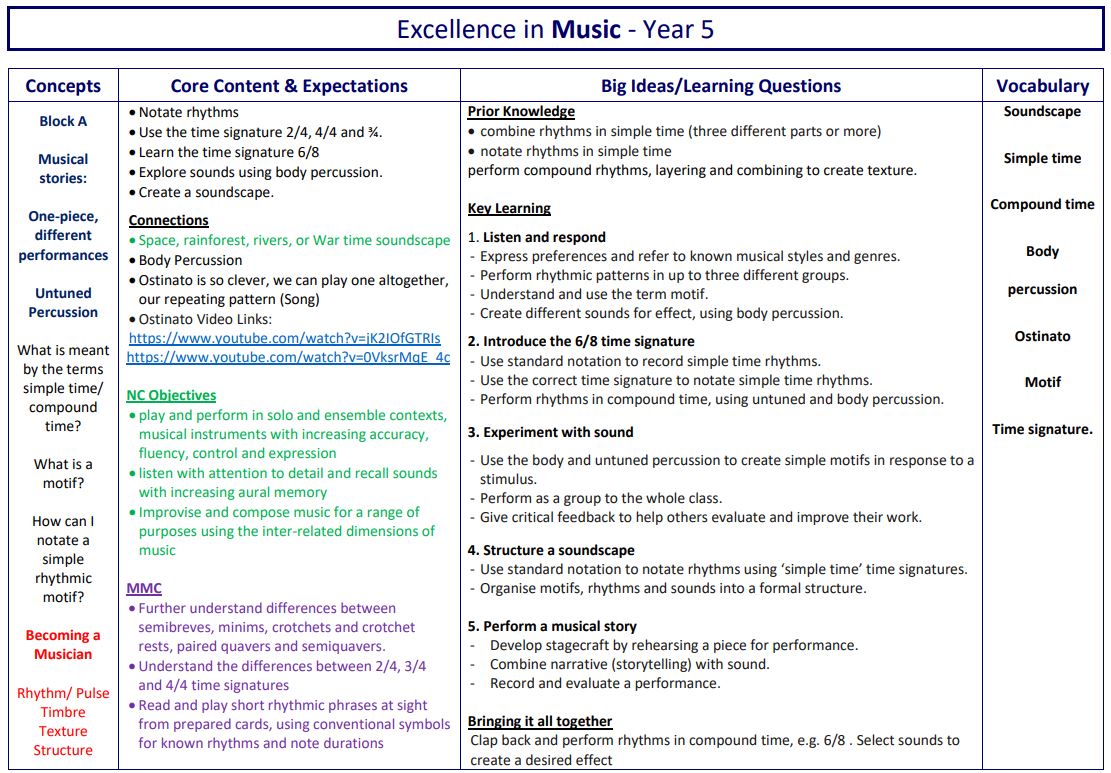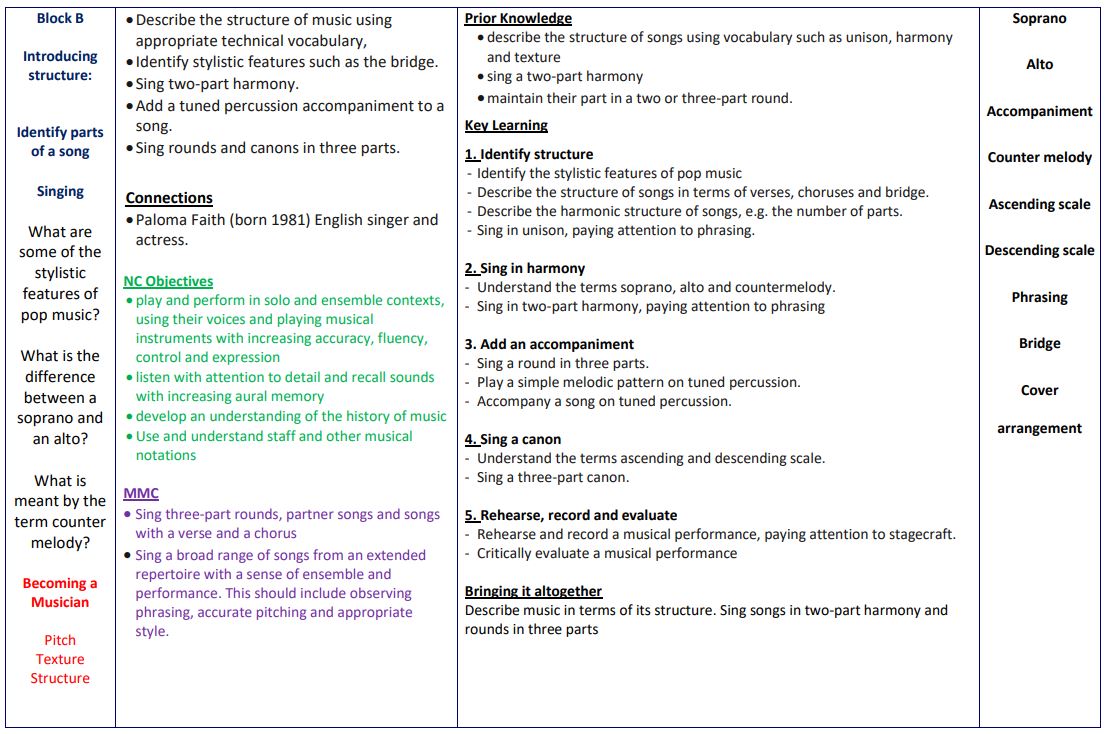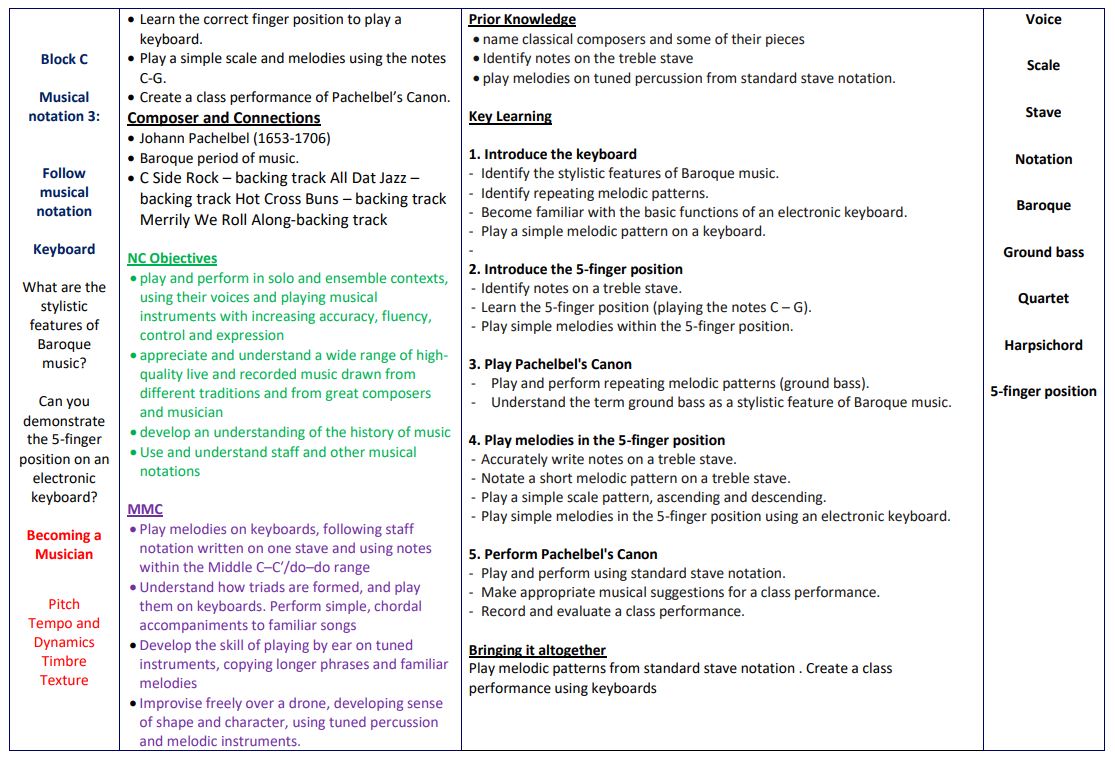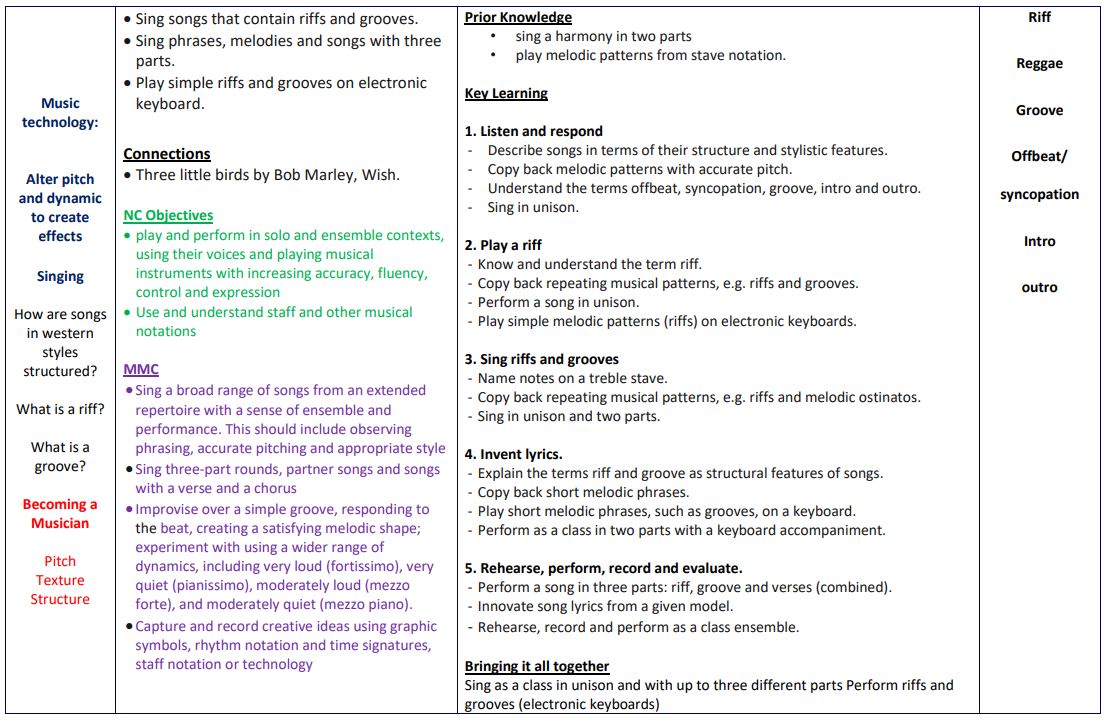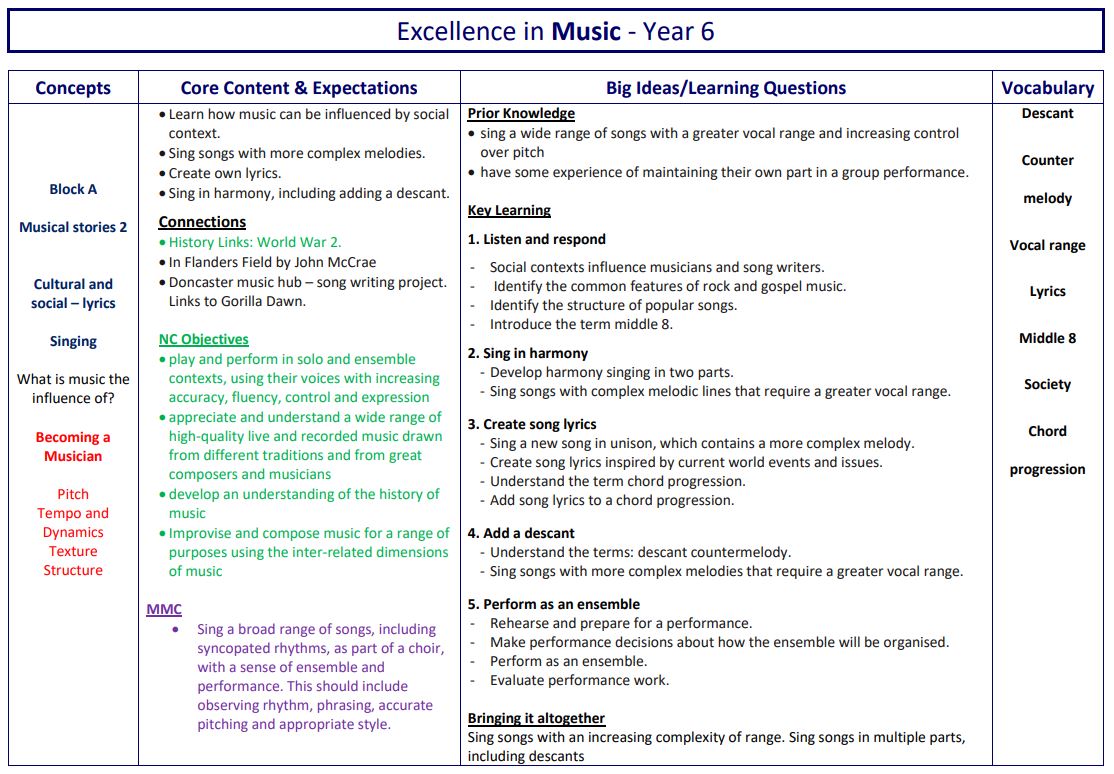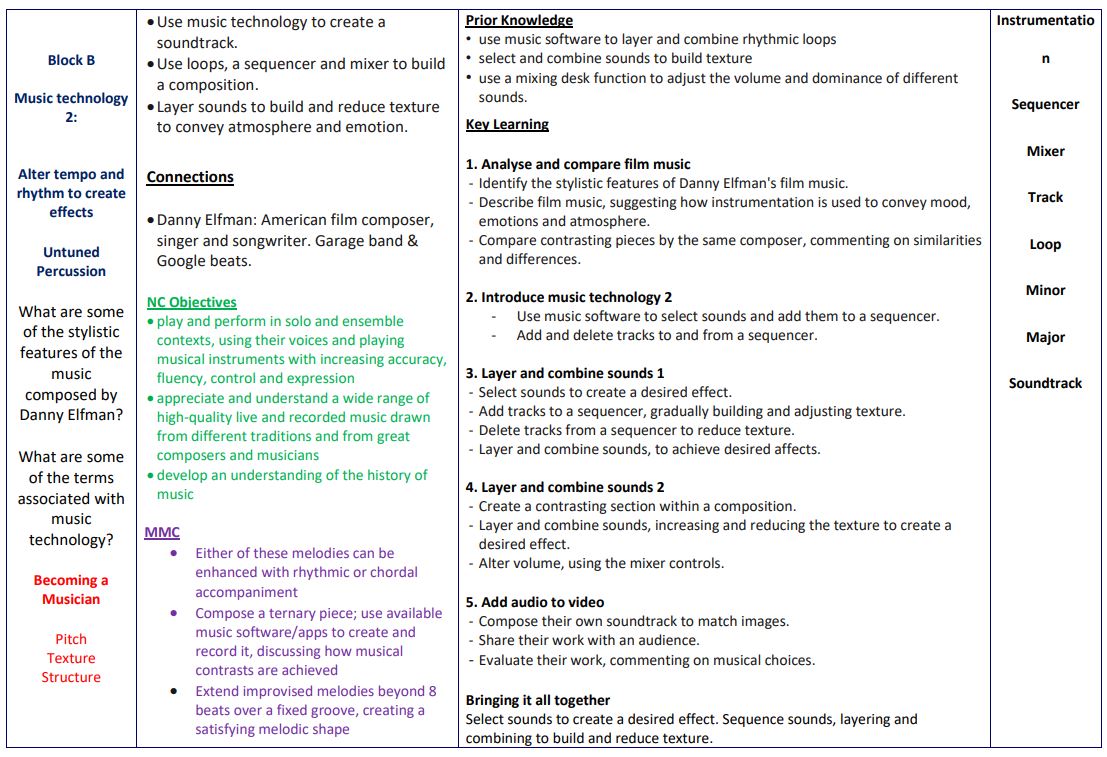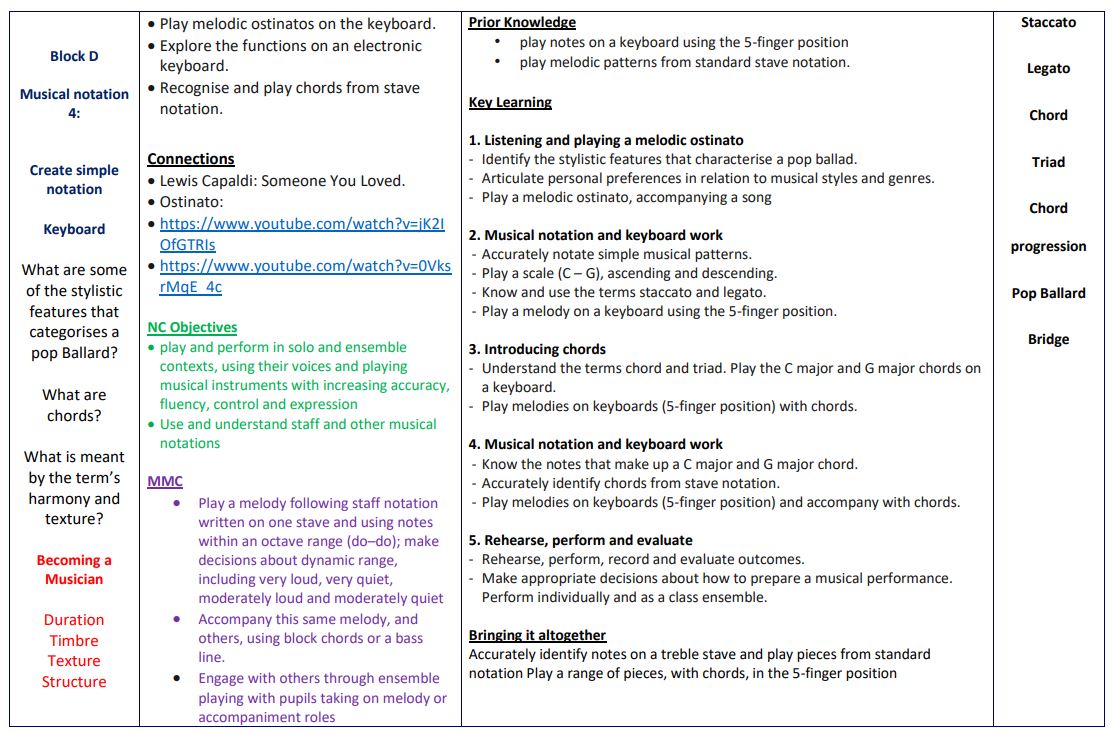Music
Introduction
It is influenced by documents and research, including: https://www.gov.uk/government/publications/research-review-series-music
1. Technical Development - this is pupils being able to translate their intentions successfully into sound. This will often involve instrumental playing or singing, but it may also focus on music technology.
2. Constructive Development – this is knowing how different musical components come together, both analytically and in the creative process.
3. Expressive Development is focused on the more indefinable aspects of music: quality, meaning and creativity.
Music is planned so that it supports pupils in developing these 3 pillars, which in turn support the core areas of study: performing, composing, musical notation, study of seminal musicians and compositions, study of the history of music.
Our Music curriculum has been deliberately built around the principles evidence-led practise. This is to ensure that pupils are equipped to successfully think, work and communicate like a musician. Unapologetically ambitious, our music curriculum focuses on pupils using both their conscious and unconscious minds through different learning experiences. Our intention is unmissable; exceptional teacher instruction inspires pupils to acquire knowledge, as a musician, and enable them to skilfully attempt and apply their understanding through high-quality development as a musician. It is our intention that through studying Music, pupils become more expert as they progress through the curriculum, accumulating, connecting and making sense of the rich tacit, procedural and declarative knowledge.
Music is taught as a discrete subject but also across the curriculum. Areas of learning, such as times tables in maths, vocabulary in languages and movement in dance can all incorporate different elements of music. A weekly singing assembly allows the children opportunities to develop their singing skills and gain an understanding of how ensembles work. We also develop pupil’s appreciation skills through a weekly composer file, that links to the assembly theme of that particular week. Performances, such as Christmas plays and nativities, end of term concerts, end of year productions, and links we have made within our local and wider community, but also nationally, demonstrate that music is important to the life of the school. Extracurricular activities, such as choir and peripatetic music lessons, also provide children with experience of making music.
Central to the learning modules are activities designed to develop pupils’ oracy and vocabulary skills to enable them to use musical language meaningfully when talking about their work and the work of others.
An overview of the core content provides information about the skills covered across the term in each year group. This enables teachers to see the progression of skills covered within each aspect of music.
• CHALLENGE Teachers get the children to interrogate their learning - summarise, explain, compare and contrast. Tools are built into routines to reduce overload and allow for hard thinking. These can be adapted for children based on their individual needs
• Pupils with SEND are entitled to think hard. We use structured CHALLENGE FRAMEWORKS to promote hard thinking, drawing on the content, including explain the word connections and sequenced thinking paths.
Careers and meaningful opportunities
At Sandringham Primary we provide career links and meaningful opportunities throughout each subject within the curriculum. Our learners benefit from: class discussions, visits from different professionals, visits, webinars and utilising our local expertise.
Teachers employ a range of strategies both at and after the point of teaching to check the impact of their teaching on the permanence of pupils’ learning. These include: retrieval practice, vocabulary use and application, deliberate practice and rephrasing of taught content, cumulative quizzing within the learning sequence, summarising and explaining the learning question from the sequence, tests and quizzes. Teachers use information from tasks, tests, pupil book studies and other monitoring to support learning by responding to the gap between where pupils are and where they need to be. In lessons, they adapt explanations and examples to address misconceptions and provide additional practice or challenge where required. After lessons or tests, they analyse pupils’ responses to identify shared and individual gaps in learning and misconceptions. Teachers then adjust subsequent planned teaching in response.
We use summative assessment is ‘to provide an accurate shared meaning without becoming the model for every classroom activity’ (Christodolou, 2017). If our curriculum is effective, it will lead to improvements in summative assessments over time. Teacher assessment judgements are against an agreed assessment model (the curriculum). We make summative judgements annually. Teachers record summative judgements on OTrack.
Pupil book study is used as a method to quality assure our curriculum by talking to the children and looking in pupils’ books. We do this after content has been taught to see the extent to which pupils are knowing more, remembering more and able to do more. In preparation, we review the planned content, knowledge and vocabulary, so that conversations with pupils are meaningful and focused on what has been taught. When looking at books, we look at the content and knowledge, teaching sequence and vocabulary. We also consider pupils’ participation and consider the explanations and models used, the tasks the pupils are asked to do, the ability to answer carefully selected questions and retrieve information and the impact of written feedback. We ask careful questions that probe their knowledge, understanding and skills.
The Subject Leader undertakes a range of activities to understand what the curriculum looks like across the school and how well pupils know more, remember more and can do more as a result. In addition to the above tools, they use learning walks, planning reviews and book looks. They use their findings to support teachers to improve how they implement subjects and to make recommendations about the suitability of the intent for their subject. The Subject Leader formally reports on impact of the curriculum termly to the Curriculum Leader, Principal and Governors.
The expected impact of following our music curriculum is that children will:
Progression Overview
Listening: children will have opportunities to respond to music through movement, altering movement to reflect the tempo, dynamics or pitch of the music. They will explore lyrics by suggesting appropriate actions, and explore the story behind the lyrics or music. Children will be exposed to opportunities to listen to and follow a beat using body percussion and instruments. When listening to music they will consider whether a piece of music has a fast or slow tempo. Children will be listening to sounds and match them to the object or instrument, and begin to develop an understanding of identifying high and low pitch. Children will copy and repeat a simple rhythm, as well as repeating simple lyrics. Children in EYFS will begin to understand that different instruments make different sounds and group them accordingly.
Composing: will provide opportunities for children to play untuned percussion ‘in time’ with a piece of music. They will be able to select classroom objects to use as instruments, and experiment with body percussion and vocal sounds to respond to music. Children in EYFS will be able to selecting appropriate instruments to represent action and mood, and experiment with playing instruments in different ways. They will also be provided with opportunities to change the lyrics to familiar nursery rhymes.
Performing: element will allow children to use their voices to join in with well-known songs from memory, as well as, remembering and maintaining their role within a group performance. They will move to music with instruction to perform actions. Opportunities will be provided for children to participating in performances to a small audience. Children will be able to stop and start playing at the right time, following the directions of a conductor.
• Notation – To know that signals can tell us when to start or stop playing.
During KS1, we aim to secure strong musical foundations for pupils. This includes a strong focus on learning musical vocabulary and significant opportunities to master rhythm and pulse.
Listening: children will recognise and understand the difference between pulse and rhythm. They will be understanding that different types of sounds are called timbres. There will be regular opportunities for children to recognising basic tempo, dynamic and pitch changes. Children will be able to describe the character, mood, or ‘story’ of music they listen to, both verbally and through movement. They will describe the differences between two pieces of music, expressing a basic opinion about music (like/dislike). Children will have opportunities to Listen to and repeat short, simple rhythmic patterns. Listening and responding to other performers by playing as part of a group. As pupils move into Year 2 they will recognise timbre changes in music that they listen to, as will as the structural features. There will be opportunities for children to recognise instrumentation. Children will begin to use musical vocabulary to describe music. They will be identifying melodies that move in steps, and represent this with dot notation. They will be able to and repeat a short, simple melody by ear, and suggest improvements to their own and others’ work.
Composing: Children will select and create short sequences of sound with voices or instruments to represent a given idea or character. They will combine instrumental and vocal sounds within a given structure, and create simple melodies using a few notes. Children will choose dynamics, tempo and timbre for a piece of music. Creating a simple graphic score to represent a composition. Children will begin to make improvements to their work as suggested by the teacher. As pupils move into year 2 they will select and create longer sequences of appropriate sounds with voices or instruments to represent a given idea or character. They will successfully combine and layer several instrumental and vocal patterns within a given structure, creating simple melodies from five or more notes. Children will be able to choose appropriate dynamics, tempo and timbre for a piece of music. They will begin to use letter name and graphic notation to represent the details of their composition. Children will begin to suggest improvements to their own work.
Performing: Children will use their voices expressively to speak and chant., and sing short songs from memory, maintaining the overall shape of the melody and keeping in time. They will be able to maintain the pulse using hands, and tuned and untuned instruments. Pupils will copy back short rhythmic and melodic phrases on percussion instruments. They will respond to simple musical instructions such as tempo and dynamic changes as part of a class performance, and being to perform from simple graphic notation. As pupils move into year 2 they will use their voices expressively when singing, including the use of basic dynamics. They will sing short songs from memory, with melodic and rhythmic accuracy. Children will copy longer rhythmic patterns on untuned percussion instruments, keeping a steady pulse. They will perform expressively using dynamics and timbre to alter sounds as appropriate. Pupils will sing back short melodic patterns by ear and playing short melodic patterns from letter notation.
Listening: Children will discuss the stylistic features of different genres, styles and traditions of music using musical vocabulary. They will understand that music from different parts of the world has different features. Children will recognise and explain the changes within a piece of music using musical vocabulary. Children will begin to show an awareness of metre. They will begin to use musical vocabulary when discussing improvements to their own and others’ work. As pupils move into year 4 they will recognise, use and understand the development of motifs in music. They will identify gradual dynamic and tempo changes within a piece of music. Pupils will recognise and discuss the stylistic features of different genres, styles and traditions of music using musical vocabulary. They will Identify common features between different genres, styles and traditions of music. Children will recognise, name and explain the effect of the interrelated dimensions of music. They will be able to identify scaled dynamics (crescendo/decrescendo) within a piece of music, and use musical vocabulary to discuss the purpose of a piece of music. They will use musical vocabulary when discussing improvements to their own and others’ work.
Composing: Pupils will compose a piece of music in a given style with voices and instruments. They will combine melodies and rhythms to compose a multi-layered composition in a given style (pentatonic). Pupils will use letter name and rhythmic notation (graphic or staff), and key musical vocabulary to label and record their compositions. They will suggest and implement improvements to their own work, using musical vocabulary. As pupils move into year 4 they will compose a coherent piece of music in a given style with voices, bodies and instruments, and begin to improvise musically within a given style. They will develop melodies using rhythmic variation, transposition, inversion, and looping. Pupils will create a piece of music with at least four different layers and a clear structure. They will use letter name, graphic and rhythmic notation and key musical vocabulary to label and record their compositions. Pupils will suggest improvements to others’ work, using musical vocabulary.
Performing: Pupils will sing songs in a variety of musical styles with accuracy and control, demonstrating developing vocal technique. They will sing and play in time with peers, with some degree of accuracy and awareness of their part in the group performance. Pupils will be performing from basic staff notation, incorporating rhythm and pitch and be able to identify these symbols using musical terminology. As pupils move into year 4 they will sing longer songs in a variety of musical styles from memory, with accuracy, control, fluency and a developing sense of expression including control of subtle dynamic changes. They will sing and play in time with peers with accuracy and awareness of their part in the group performance. Children will play melody parts on tuned instruments with accuracy and control and developing instrumental technique. They will begin playing syncopated rhythms with accuracy, control and fluency.
Listening: Pupils will recognise and confidently discuss the stylistic features of different genres, styles and traditions of music using musical vocabulary. They will represent the features of a piece of music using graphic notation, and colours, justifying their choices with reference to musical vocabulary. They will compare, discussing and evaluating music using detailed musical vocabulary. Pupils will develop confidence in using detailed musical vocabulary to discuss and evaluate their own and others’ work. As they move into year 6 they will discuss musical eras in context, identifying how they have influenced each other, and discussing the impact of different composers on the development of musical styles. Recognising and confidently discussing the stylistic features of music and relating it to other aspects of the Arts. Pupils will represent changes in pitch, dynamics and texture using graphic notation, justifying their choices with reference to musical vocabulary. They will identify the way that features of a song can complement one another to create a coherent overall effect. Pupils will use musical vocabulary correctly when describing and evaluating the features of a piece of music. They will be able to evaluate how the venue, occasion and purpose affects the way a piece of music sounds. Pupils will confidently use detailed musical vocabulary to discuss and evaluate their own and others work.
Composing: Pupils will compose a detailed piece of music from a given stimulus with voices, bodies and instruments. They will be able to improvise coherently within a given style. Pupils will combine rhythmic patterns (ostinato) into a multi-layered composition using all the inter-related dimensions of music to add musical interest. Using staff notation to record rhythms and melodies. Pupils will select, discuss and refine musical choices both alone and with others, using musical vocabulary with confidence, suggesting and demonstrating improvements to own and others’ work. As pupils move into year 6 they will improvise coherently and creatively within a given style, incorporating given features. They will compose a multi-layered piece of music from a given stimulus with voices, bodies and Instruments. Pupils will compose an original song, incorporating lyric writing, melody writing and the composition of accompanying features, within a given structure. They will develop melodies using rhythmic variation, transposition and changes in dynamics, pitch and texture, recording their own composition using appropriate forms of notation and/or technology and incorporating. They will be able to constructively critique their own and others’ work, using musical vocabulary.
Performing: Pupils will sing songs in two or more parts, in a variety of musical styles from memory, with accuracy, fluency, control and expression. They will worki as a group to perform a piece of music, adjusting dynamics and pitch according to a graphic score, keeping in time with others and communicating with the group. Pupils will perform with accuracy and fluency from graphic and simple staff notation. They will be able to play a simple chord progression with accuracy and fluency. As pupils move into year 6 they will sing songs in two or more secure parts from memory, with accuracy, fluency, control and expression. Pupils will work as a group to perform a piece of music, adjusting the interrelated dimensions of music as required, keeping in time with others and communicating with the group. They will perform a solo or take a leadership role within a performance. Pupils will perform with accuracy and fluency from graphic and staff notation and from their own notation. They will perform by following a conductor’s cues and directions.
